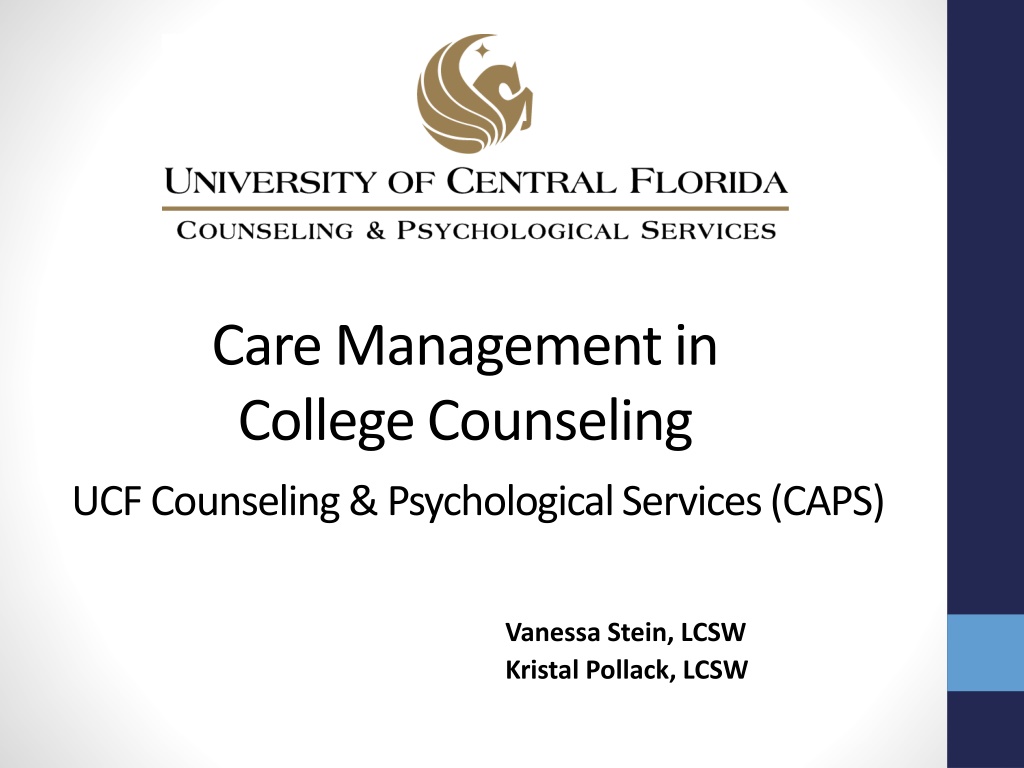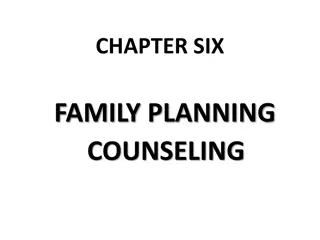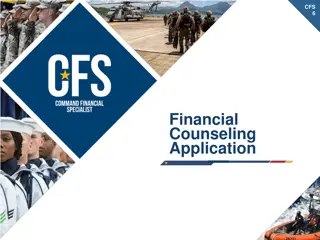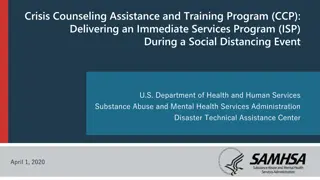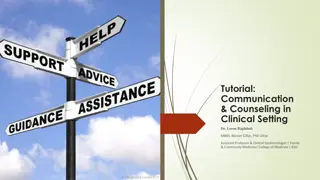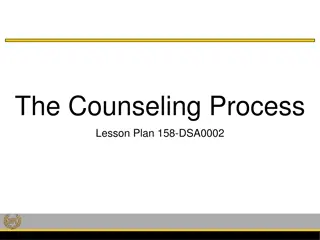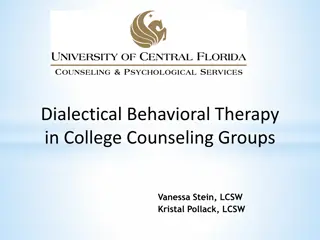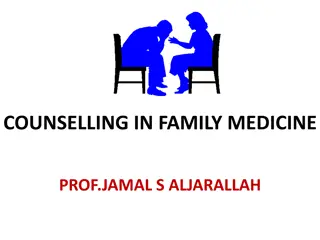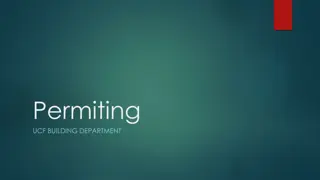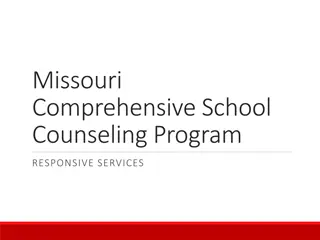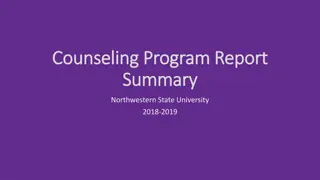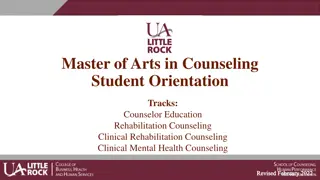Comprehensive Care Management in College Counseling at UCF CAPS
UCF Counseling & Psychological Services (CAPS) offers a wide range of clinical services focusing on student psychological and developmental needs. With a dedicated Care Management Team (CMT), CAPS provides wrap-around services to seamlessly integrate mental health care for UCF students. Through individual, couples, and group counseling, crisis intervention, expressive arts therapy, and more, CAPS aims to be an essential resource promoting student-centered practices. The team includes experienced LCSWs like Kerry Fichthorn and Kristal Pollack, who bring diverse expertise in areas such as substance abuse, crisis intervention, depression, and anxiety. Located on campus with multiple satellite locations, CAPS serves as a vital support system for the UCF community.
Download Presentation

Please find below an Image/Link to download the presentation.
The content on the website is provided AS IS for your information and personal use only. It may not be sold, licensed, or shared on other websites without obtaining consent from the author. Download presentation by click this link. If you encounter any issues during the download, it is possible that the publisher has removed the file from their server.
E N D
Presentation Transcript
Care Management in College Counseling UCF Counseling & Psychological Services (CAPS) Vanessa Stein, LCSW Kristal Pollack, LCSW
About UCF CAPS Clinical Services at CAPS provides comprehensive psychological services to the UCF community. We promote practices that are student-centered and aspire to be seen as an essential resource to the UCF com-munity. In this effort, we offer a range of clinical services focusing on student s psychological and developmental needs. We provide short term individual, couples and group counseling, workshops, campus presentations, crisis intervention, animal assisted therapy, expressive arts therapy, a peer educators program, yoga therapy and other innovative interventions
About UCF CAPS CAPS is located on campus, in a separate building next to student health services, student housing and across from student classrooms New satellite locations this year in residence hall and close to the arena at Knights Plaza UCF has 59,000 students, making it the second largest university in the US UCF CAPS has 40 full time clinicians (some OPS), 3 doctoral interns and 6 premasters interns We serviced 3223 students, 14,655 individual appointments during the 2012-2013 academic year. CAPS provided 1,468 same day walk in appointments in the 2012- 2013 academic year.
Care Management Team The purpose of the Care Management Team (CMT) is to provide wrap-around services to students. This approach provides a valuable bridge between our internal departments on campus and other services in the community in an effort to provide UCF students with integrated mental health care. The CMT strives to serve the needs of our students and the University through efforts to coordinate case management, monitor referrals, promote coordination and monitoring of care through collaboration among departments or agencies, improve communication, and facilitate coordination and continuity of care in complex cases.
Care Management Team Kerry Fichthorn is a LCSW who graduated from FCGU and has been with CAPS since January 2014. She is a Certified Addictions Professional. Her professional interests include substance abuse, mental health, crisis intervention, legal issues, and community work. Past experience in community mental health & substance abuse court programs and criminal justice settings. Sits on the Substance Abuse Treatment Team. Kristal Pollack is a LCSW who graduated from FSU and FIU has been with CAPS since August 2013. Interests include depression, anxiety, non suicidal self injury, and crisis intervention. Past experiences include homeless shelter for youth, school social work, and community mental health. Campus liaison to Active Minds, and Nike and Hercules Resident Halls. Created and co-facilitates a DBT group for high risk students. Sits on the Eating Disorders Treatment Team. Vanessa Stein is a LCSW who graduated from UF and UCF and has been with CAPS since January 2013. She is a member of NASW and is a qualified Supervisor for the State of FL. Interests include anxiety, non suicidal self injury, grief & loss, crisis intervention and mindfulness. Past experiences in healthcare, hospice, and middle school settings. Campus liaison with VARC (Veterans) and Hillel (Jewish students). Awarded a grant to launch an innovative Peer Educators program. Created and co- facilitates a DBT group for high risk students. Sits on the Substance Abuse Treatment Team.
Care Management Team CAPS has three full time Licensed Clinical Social Workers assigned as Care Managers In 2013, CMT saw 207 students at 617 unique appointments CMT assist students, who previously might have fallen through the cracks, with issues such as: Chronic mental health concerns Suicidal and homicidal thoughts Non-suicidal self-injury Substance use Complex medical needs Financial stress Lack of insurance Lack of basic essentials Learning disabilities Lack of motivation for change Medication compliance
Care Management Team CMT facilitate the coordination of services to meet the needs of an individual student CMT assesses a student s situation, participates in planning, implementing, coordinating, monitoring and evaluating options and services CMT assists in motivating students to make appropriate connections, modeling the counseling relationship, and encouraging students to seek positive change CMT will initiate and organize the flow of mental health information between CAPS and the Office of Student Rights and Responsibilities, Student Disability Services, Health Services, the local hospitals and clinics, private practitioners CMT develops after-care plans for CAPS clients, and monitor the progress of plans to ensure a successful triage or transfer of mental health care CMT helps students medically withdrawal from the university
CMTProcess IA/TA Recommendation Extended IA to gather more info Individual Counseling 1 session referral CMT First Ongoing Session 4-6 sessions Risk Monitor/Stabilization Motivational Interviewing Wrap Around Services First Ongoing Session 4-6 sessions Group/Workshops Screens
Theoretical Approach within CMT Model All models below are within a short term therapy framework and used simultaneously with case management services Crisis Intervention-used to help those who have experienced an event that has triggered an immediate state of disequilibrium resulting in the student to not be able to access typical methods to cope and/or access resources. The goal here is short term and immediate with the therapist taking an active role to work on reducing the intensity of the reactions to the crisis and return to a normal level of functioning using coping skills. Cognitive Behavioral Therapy (CBT)- student works on identifying and changing irrational thought patterns and behavior to more rational thinking and behaviors. Dialectical Behavioral Therapy (DBT)- student works on emotion regulation, distress tolerance, building interpersonal effectiveness, and mindfulness Solution Focused Therapy- student works on focusing on present and the future and is goal directed focusing primarily on the solutions vs. the actual problem. Motivational Interviewing-used with the therapist taking an active role in eliciting and strengthening the student s motivation for change. Within this approach, the students ambivalence is explored and resolved. The students level of motivation for change needs to be considered here in order for treatment to be effective. Transtheoretical Model of Behavior Change assesses an individual's readiness to act on a new healthier behavior, and provides strategies, or processes of change to guide the individual through the stages of change to Action and Maintenance.
CMT Benefits & Challenges Benefits: Provides consistent and frequent follow up care for students Allows for flexibility in treatment approach Allows for the ability to identify high risk students sooner Treatment team approach in connecting with other on and off campus providers Therapist serves as an advocate for the student
CMT Benefits & Challenges Challenges: Noncompliance from students High liability, working with high risk, high chronicity can lead to burn out Lack of follow through on connecting to referrals and resources High no-show rates Lack of motivation, readiness for changes Lack of insight Limited resources
Demographic Information Client was a 18 year old bi racial, heterosexual, Christian, freshman female in a committed relationship majoring in Education Presented with history of Baker Acts, inpatient treatment, intensive outpatient treatment, long term individual therapy, chronic suicidal ideations and self injurious behaviors Diagnosed with Major Depressive Disorder On anti-depressants for the last two years First semester in college, living on campus No support in town
Case Scenario Follow up Risk factors Treatment Plan Past hospitalizations, most recent baker act on campus Most recent SI/HI and SIB s Risk of academic failure Medication management Personal safety Lack of support Explained CAPS services and our scope of services including crisis services and case management model Referred to student health services psychiatry for medication management Continued assessment for risk SI/HI/SIB and provided intervention for stabilization Obtained releases of information to facilitate connection with healthcare providers for continuity of care in the community Obtained release for parent involvement Obtained and coordinated services with Office of Student Rights and Responsibilities after Baker Act Provided education and connection to Academic services for medical withdrawal
Resources On Campus Student health Services- Psychiatry, medical evaluations, dietician, women's health, lab works, insurance Wellness and Health Promotions- AOD screening, assessment and treatment, Community Counseling Clinic, Psychology Clinic Treatment teams- EDTT, SATT Student Disability Services Student Veterans Services Bus/transportation Off campus Central receiving unit for Baker Acts Community Provider Database Pro bono Services ProtoCall 24 hours crisis hotline
Community Provider Database This is an effective tool available to our students, parents, clinicians, faculty and staff in assisting them in seeking the appropriate resources/referrals for long term counseling based on various search criteria Search criteria on the CPD is based on types of Mental Health Professionals, Zip Code, Health Insurance Coverage/Plans, Areas of Specialty, Gender Preferences of a Provider and if resource is within close proximity to UCF Main Campus Meetings area held periodically and ongoing by CMT staff to connect with community providers, to formally meet them and inform them of our services and our database A community provider can create a profile by logging into our system and creating a username and password to be able to access any time in future to edit or update their information as needed CMT staff who manages the CPD, ensures that the provider is qualified and holds no disciplinary actions towards their clinical licensure and approves profile
Community Provider Database We have been also expanding our CPD to reach out and include community providers within other Central Florida counties outside of Orange county due to the increase in student population attending the various Regional Campuses throughout. These counties include Seminole, Brevard, Volusia, Osceola, Lake and Polk counties. CMT therapist managing the CPD has access to view those providers on our CPD that provide pro-bono counseling services. This is kept track by our CMT therapist to ensure that those students that are in dire need with no insurance coverage and/or no financial means can access these services To log unto our CPD, go to http://cpd.sdes.ucf.edu
Future Outlook Data from UCF CAPS on CMT services showing trends and needs for ongoing use of model 25 hospitalized students Fall 2012-Summer 2013 34 hospitalized students Fall 2013 Utilization of walk-in crisis services increased 42.9% compared to 2011- 2012 and a 64.4% increase compared to 2010-2011 70% of students reported significant depressive symptoms, 65% reported significant generalized anxiety symptoms 18% of students report concerns of I have thoughts of ending my life , 13% of students report concerns of I am afraid I may lose control and act violently A large number of students are coming to campus already connected to Psychiatry for psychotropic medications, substance use, and managing psychotic symptoms Even 5 years ago these students would not likely be enrolled!
Future Outlook. DBT group new this semester high risk students who struggle with emotions, distress, relationships and compliance Getting Ready for Treatment workshop to enhance motivation and prepare students for counseling Provide workshops on various topics tailored to care management students such as self care , social skills building and building supports CAPS now has a Social Skills group! Creating CMT Treatment Team Meetings with all providers on campus (SHS , CAPS, OSRR and OSC) Add more search criteria to our CPD to include local mental health agencies , hospitals and treatment/rehabilitation facilities CMT staff will continue to participate, receive training and collaborate in higher education case management
